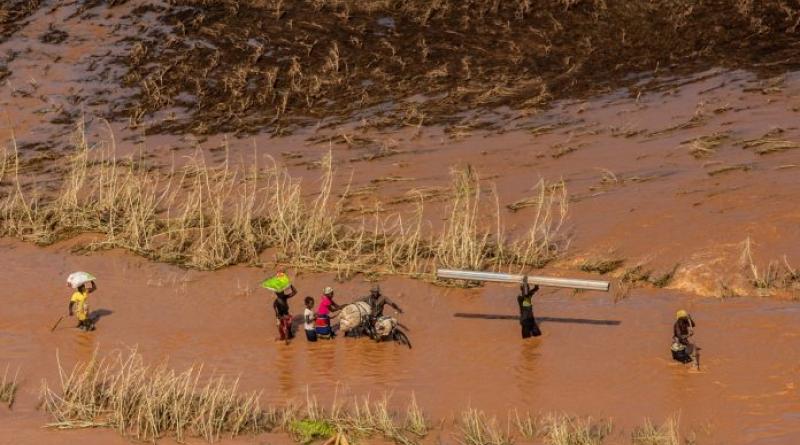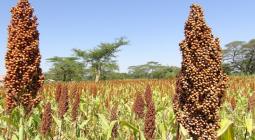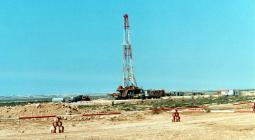Why climate change is Africa’s biggest ‘existential challenge’

Climate change is the biggest “existential challenge” to Africa’s development and is eroding many of its development gains, according to the African Development Bank.
Between 2020 and 2021 alone, the continent, which is warming faster than the global average, was hit by more than 131 extreme weather events, including floods, storms, droughts and wildfires.
These have “cost Africa dearly”, said Kevin Urama, the bank’s acting chief economist and vice-president. “These have cost different countries huge amounts of resources in building infrastructure that was swept away by floods and destroyed by cyclones, and so on … The little space of development that we gain gets wiped out with infrastructure, roads, housing and lives lost due to these climate effects.”
Losing GDP
Earlier this year, the bank published its African Economic Outlook 2022, which is themed on supporting climate resilience and a just energy transition in Africa. It described how on average, from 1986 to 2015, Africa lost between 5% and 15% of its GDP per capita growth, because of climate change. This is in addition to increasing mortality, climate-induced conflicts and human displacements and migration, among other impacts observed across the continent.
The report detailed how, despite having 17% of the current global population, Africa has accounted for a negligible 3% of cumulative worldwide carbon dioxide (CO2) emissions historically. “However, climate change and extreme weather events disproportionately affect the continent, with severe economic, social and environmental consequences for its people.”
For Urama, these extreme weather events show him that climate change is an “existential challenge” because Africa doesn’t have control over it. “It doesn’t matter whether Africa doesn’t emit one tonne of CO2 or emits a zillion, because the actions of the rest of the world will continue to impact the continent,” he said.
Africa is the least climate-resilient region in the world, with high vulnerability to climate change and low readiness for adaptation to climatic shocks, he said.
Gas the transition fuel
The report says universal access to energy services is one of the United Nations’ 17 sustainable development goals and is a key factor in achieving other SDGs, including climate goals.
“Energy consumption is highly correlated with GDP growth. So, restraining country access to energy means restraining social and economic progress of countries. In Africa, low per capita electricity consumption (550kWh) compared to other regions significantly constrains economic production and structural transformation in African economies.”
Energy transitions evolve gradually over time, often over several decades, defined by technologies, market incentives, policy shifts and consumer behaviour. “Natural gas has served as a transition fuel during the period, allowing countries to gradually reduce coal in the energy mix cost effectively.”
Africa’s energy mix has a lower carbon intensity compared to other regions. The report notes how the share of coal in the mix has declined progressively from 54% to 29% between 1985 and 2020, respectively.
A just energy transition, the report said, requires that African countries harness opportunities in the fast-expanding global green growth technologies and markets. “Africa has unique competitive advantages in several green growth sectors: materials, components, products and services, which it needs to harness to benefit from the green transition. Renewables and decentralised energy systems are critical for rapid energy access and need to be co-designed with grid expansion.”
Global policy shifts, technology and market trends suggest that continued investments in fossil energy, the report said, run the significant risk of becoming stranded assets in the coming decades. This means that they will lose value or turn into liabilities before the end of their expected economic life.
“Therefore, while Africa must maintain a balanced energy mix to manage short-term energy security, rapid investments to harness the significant opportunities in the green growth sectors will be critical for the continent’s competitiveness in the medium to long term. Africa’s resource potentials present unique opportunities for the continent to lead in several green development sectors.”
Energy necessity
Climate policies, such as those on climate finance, are increasingly being interpreted to “short-change” Africa’s development, Urama said. The level of growth and development informs the level of capacity to adapt to climate change effects.
“And the policies that are now being interpreted, for example in the energy sector, is that we cannot use our natural assets to be able to build out the energy systems, which we have very low levels of in Africa.
“There’s a very high correlation between energy access, electricity consumption and GDP growth. So, Africa can easily be locked at lower levels of growth if climate policies are interpreted in a way that is not just for Africa. That’s increasingly happening like the issues of the use of gas to power, technologies for renewable energy and so on.
“If you look at that transition over time in every energy system, the use of gas as a transition fuel is fundamental. And this is for achieving global sustainability goals … because when you think about transitions, you need to think about two sides of the equation. One is not stopping economic growth and not polluting the environment so much that we will not be able to recover.”
If Africa increases its gas to power significantly, “our calculations are that it will increase CO2 emissions by 0.6%. That’s infinitesimally small, considering that Africa is still at a very low level of emissions and still has a very high carbon headroom,” he said.
Global climate goals won’t be achieved
The report found that to adequately implement its nationally determined contributions (NDCs) — public pledges from countries on how they plan to play a part in post-2020 collective action on climate change — Africa will require up to $1.6-trillion between 2022 and 2030.
Collectively, African countries received only $18.3-billion in climate finance between 2016 and 2019. This leaves an average climate financing gap of $108-billion per year during the period. “With current trends, Africa’s conditional NDCs will not be delivered. The implications of not achieving the NDCs in Africa for global sustainability is obvious — the global climate goals will not be achieved.”
Urama said: “The climate finance flows are not coming to Africa at the scale that it should to be able to have Africa transition quickly to the new energy systems, climate-resilient development pathways, that are required for this. On all sides, I see an existential challenge that is actually beyond Africa’s control.”
Developed countries, the report said, should honour their commitment to make available $100-billion annually to developing countries to support climate action, as new and additional resources. “If one thinks of what is owed in carbon debts to Africa ($4.8-trillion), what is required to implement the NDCs ($1.6-trillion by 2030), and what is currently received annually ($18.3-billion), it tells its own story.”
Global commons problem
Climate change, Urama said, is a global commons problem. “That means it doesn’t matter how much Europe or America spend on their environmental policy and climate policy. If Africa doesn’t do the same, the world is still in trouble … Greenhouse gases don’t need a visa and [neither] do the impacts.”
The social inequalities that are being created will increase pressures on economies. “It will increase terrorism, it will increase unskilled migration — it will include all those public policies that countries spend billions and billions trying to address. So why not address the problem at its roots? Because, if we remove poverty, we will increase peace and security, we will reduce migration and the drivers … for terrorism.”
Ahead of COP27, Urama hopes that African countries rally together to request increased climate finance and increased knowledge and technology flows to help Africa build its adaptation capacity, “because without that it’s really very unlikely that African countries will be able to continue to shoulder the impacts of climate change”.
cover photo: These have cost different countries huge amounts of resources in building infrastructure that was swept away by floods and destroyed by cyclones, and so on." (Photo by Andrew Renneisen/Getty Images)





